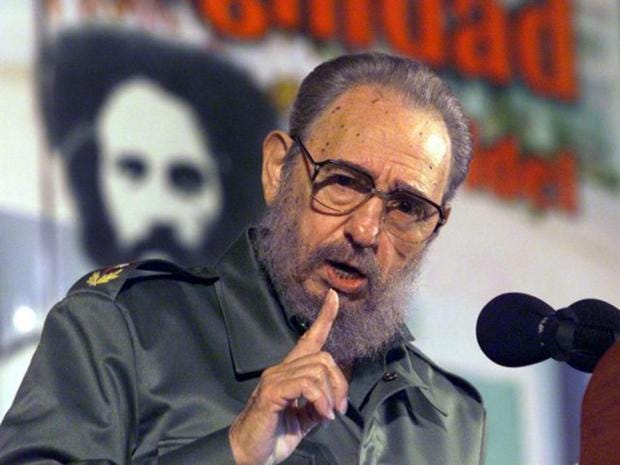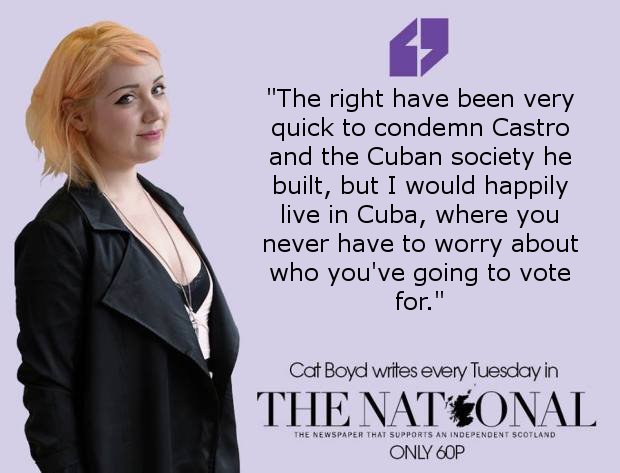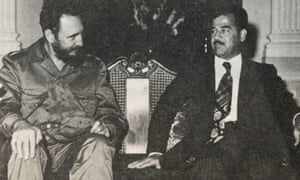Cuba Libre
Here's another interesting article on Cuba by a chap called Bobby Gosh who's editor-in-chief of the Hindustan Times.
Now Bobby was a big fan of Fidel Castro and Cuba not that long ago, but instead of sticking resolutely to his own political prejudices Bobby reflected on the evidence of his own eyes and ears, before reaching the conclusion that a one-party, one-family state was part of the problem.
Unlike Labour leader Jeremy Corbyn, for example, who described Fidel Castro as a heroic figure which he undoubtedly was more than 50 years ago before turning into another tinpot dictator.
Robert Mugabe, the president of Zimbabwe, is another example of a former freedom fighter who ended up replacing one terrible tyranny with another.
http://www.hindustantimes.com/columns/fidel-castro-may-be-india-s-hero-but-he-was-cuba-s-villain/story-dcDO1CqqqAicN2XoGGmw1N.html
Fidel Castro may be India’s hero but he was Cuba’s villain
By Bobby Ghosh - Hindustan Times
Left Front chairman Biman Bose, CPI(M) state secretary Surya Kanta Mishra and other Left party leaders during a rally to pay respect to Cuban leader Fidel Castro in Kolkata, November 26, 2016. (PTI)
I was raised to revere Fidel Castro. I grew up in India in the 1970s and 80s, when Cuba’s revolutionary leader was portrayed, by our media and political leaders alike, as a saviour of his people and one of the Third World’s champions in the political contest against the First. As I grew older, and became more aware that he was a communist dictator, I was still inclined to give him the benefit of the doubt, if for no other reason than the fact that he was a friend of India.
It took a trip to Cuba to knock Castro off the pedestal in my mind. It was the summer of 2009, Castro was about to turn 83, and had been out of office slightly less than a year, having handed the reins to his brother Raúl. Castro had ruled the country since 1959, when he toppled the repressive dictator Fulgencio Batista. Given the duration of his reign — and the sheer ubiquity of it — there could be no doubt that the Cuba I saw was entirely the expression of his will, his vision for what his country should be.
And what a dark, depressing vision it was. Cubans were unfree and unhappy, their country decrepit. Poverty was everywhere: The average official salary was around $25, a pittance even when offset by State-provided education, healthcare and subsidised housing. Most people scrounged together a living by working second and third jobs, even though this was illegal. The Malecon, a lovely corniche that is iconic to Havana as Marine Drive is to Mumbai, was full of prostitutes, many of them plainly children. Late at night, many of them relocated to the lobby of my hotel, one of Havana’s finest; some of the girls were being pimped by their fathers.
Most citizens had no Internet, and only the élite had mobile phones. Never mind imported goods, even some Cuban products were out of reach for locals, usually by official fiat. Invited to the rehearsals of one of the island’s most famous bands, I brought a couple of bottles of 7-year-old local rum, purchased from the duty-free shop in my hotel. My hosts reacted as if I’d brought them the finest champagne: They explained that locals have no access to their country’s best rum.
In Havana and Cienfuegos, the two cities I visited, shops and markets were poorly supplied. Fish and vegetables were scarce, which was mystifying since Cuba is surrounded by seas, and the countryside is lush. The food in State-run restaurants was tasteless, but you could get a halfway decent meal in a “paladar”, one the private eateries (often no more than a dining room in the cook’s home) permitted by the government to feed tourists.
Although technically on vacation, I had been given some local contacts by friends in New York, and I asked one of them if he’d help me meet some independent-minded people. “The easiest way to do that is to go outside and paint some anti-Castro signs on a wall,” he said, with a mischievous smile. “The police will throw you in jail… which is where you’ll find most of the independent-minded people.”
He did take me to see a prominent dissident who was not then in prison. I was greeted with mock-reproach: “So you’re the one from America, the country responsible for all our problems.” The joke alluded to a long-standing fallacy that Cuba’s wretchedness is the result of the US embargo imposed in the early 1960s. The Castro regime has used this ever since as a ready excuse for its own ineptitude and corruption, but the dissident knew better.
No other major country joined the American blockade, and Cuba had plenty of opportunity to build strong economic relations with other countries that would have compensated for the loss of the US market, goods and capital. Indeed, it could have become prosperous on the strength of its tourism potential alone. The year of my visit, Cuba received over 2 million foreign tourists, enough to create substantial wealth for its population of 11 million. (For context, India, with a population of over 1 billion, received 5.5 million foreigners that same year.) To more efficiently exploit tourists, the government requires foreigners to use a special currency, the Convertible Peso, pegged artificially to the US dollar — essentially a form of official price-gouging. But the money thus extorted doesn’t go to ordinary Cubans; someday, when the regime has finally fallen, we will learn where it went.
Castro’s apologists frequently cite the island’s education and healthcare systems as proof that the regime isn’t all bad. The dissident I met gave a hollow laugh when I brought this up, saying, “Slave-owners used to argue their slaves were better off in the plantations, where at least they got food and shelter, rather than in the jungles of Africa, where they could be killed by lions.” These are highly selective indices, chosen to defend the regime’s poor performance in many, many others. Take a broader view, using the UN’s Human Development Index, and Cuba’s performance pales, even against other Caribbean nations. In 2009, it was behind Barbados and Antigua & Barbuda in HDI rankings, and it has only got worse since: In addition to those two neighbours, Cuba now trails Bahamas and Trinidad & Tobago. Needless to say, it brings up the rear in every index of freedom, whether political, cultural or economic. According to the World Health Organization, Cubans live longer than others in the Caribbean, but I can’t help thinking that they’d all be better off if one particular Cuban had not been blessed with longevity.
Bobby Ghosh is editor-in-chief of Hindustan Times
Talking Tripe (30/11/16)
I watched BBC's Question Time last week as a young woman, Cat Boyd, made a complete fool of herself by revealing that she had failed to vote in the great EU referendum.
"Technically, I was out of the country" explained Cat to a live TV audience, as if she had never heard of postal or proxy voting in the most significant political event of recent years.
At the time I thought this was just a one-off, but here is Cat again in the pages of The National cheerfully extolling the virtues of living in Cuba's one-party state under what she clearly regards as a 'benevolent' dictatorship.
Strange that a 'socialist' should espouse such nonsense, but for a more sober and balanced view of Castro's Cuba read the following article by Zoe Williams in The Guardian and Sean O'Grady in The Independent.
Apparently, Cat studied politics at university and stood for election to the Scottish Parliament in 2016, but managed to win just 1% of the vote in Glasgow as a RISE candidate.
I can't say I'm at all surprised because this is the kind of reheated 'leftist' claptrap that you'd expect to hear from Jeremy Corbyn or his cheerleader-in-chief, Unite's Len McCluskey.
"Technically, I was out of the country" explained Cat to a live TV audience, as if she had never heard of postal or proxy voting in the most significant political event of recent years.
At the time I thought this was just a one-off, but here is Cat again in the pages of The National cheerfully extolling the virtues of living in Cuba's one-party state under what she clearly regards as a 'benevolent' dictatorship.
Strange that a 'socialist' should espouse such nonsense, but for a more sober and balanced view of Castro's Cuba read the following article by Zoe Williams in The Guardian and Sean O'Grady in The Independent.
Apparently, Cat studied politics at university and stood for election to the Scottish Parliament in 2016, but managed to win just 1% of the vote in Glasgow as a RISE candidate.
I can't say I'm at all surprised because this is the kind of reheated 'leftist' claptrap that you'd expect to hear from Jeremy Corbyn or his cheerleader-in-chief, Unite's Len McCluskey.
Forget Fidel Castro’s policies. What matters is that he was a dictator

We need not agonise over whether Cuba’s former leader was a hero or villain. His rule was an insult to the principles of the left
‘We cannot afford to argue the toss about dictators, parse the difference between the really bad ones and the less bad ones who looked cute in a beret.’ Fidel Castro poses with Saddam Hussein. Photograph: Getty Images
The death of Fidel Castro brings a tide of anti-travelogues, memories of a crumbling Havana and a degraded people from holidays that realistically can’t have been that bad, otherwise any reasonable person would have cut them short. Prostitution was rife among women and men; there was nothing to buy except black beans and odd socks; and voting, assembling, entering the lobby of a tourist hotel and being homosexual were all proscribed. The life of this 90-year-old is nothing to celebrate; the fact of his death makes it all the more urgent to speak ill of him. And the litany of his abuses is laid down, not really in the service of historical accuracy, but more as a challenge to the left: a dare to lefties, especially those in the baby-boomer generation, to mourn Castro as their hero.
It is a challenge they are unable to pass up. Jeremy Corbyn spoke rather obliquely of Castro as a “massive figure in the history of the whole planet”. It was a fudge and a tautology – anyone whom history remembers is a massive figure in history – but he chose a side eventually, praising Castro’s “heroism”, “for all his flaws”. Ken Livingstone sailed straight for the choppiest waters. Livingstone approaches history like a toddler with a cattle prod, and one can only brace for the needless shock of insult. He delivered: “Initially he wasn’t very good on lesbian and gay rights, but the key things that mattered was that people had a good education, good healthcare and wealth was evenly distributed.” By “initially”, he means “for the first two decades of his rule”; by “not very good”, he means “incarcerated homosexuals in labour camps”; but sure, let’s not get aerated about it. It’s not as if it were a key thing that mattered.
I went to Cuba in the 90s, and the poverty – or, to put it more precisely from the observable data of the tourist, the abject lack of stuff – was unignorable. The museum proudly displaying the shirt in which Che Guevara was fatally shot didn’t look terribly different from the window of Havana’s largest clothes shop, a couple of threadbare shirts stapled to the wall at jaunty angles.
The death of Fidel Castro brings a tide of anti-travelogues, memories of a crumbling Havana and a degraded people from holidays that realistically can’t have been that bad, otherwise any reasonable person would have cut them short. Prostitution was rife among women and men; there was nothing to buy except black beans and odd socks; and voting, assembling, entering the lobby of a tourist hotel and being homosexual were all proscribed. The life of this 90-year-old is nothing to celebrate; the fact of his death makes it all the more urgent to speak ill of him. And the litany of his abuses is laid down, not really in the service of historical accuracy, but more as a challenge to the left: a dare to lefties, especially those in the baby-boomer generation, to mourn Castro as their hero.
It is a challenge they are unable to pass up. Jeremy Corbyn spoke rather obliquely of Castro as a “massive figure in the history of the whole planet”. It was a fudge and a tautology – anyone whom history remembers is a massive figure in history – but he chose a side eventually, praising Castro’s “heroism”, “for all his flaws”. Ken Livingstone sailed straight for the choppiest waters. Livingstone approaches history like a toddler with a cattle prod, and one can only brace for the needless shock of insult. He delivered: “Initially he wasn’t very good on lesbian and gay rights, but the key things that mattered was that people had a good education, good healthcare and wealth was evenly distributed.” By “initially”, he means “for the first two decades of his rule”; by “not very good”, he means “incarcerated homosexuals in labour camps”; but sure, let’s not get aerated about it. It’s not as if it were a key thing that mattered.
I went to Cuba in the 90s, and the poverty – or, to put it more precisely from the observable data of the tourist, the abject lack of stuff – was unignorable. The museum proudly displaying the shirt in which Che Guevara was fatally shot didn’t look terribly different from the window of Havana’s largest clothes shop, a couple of threadbare shirts stapled to the wall at jaunty angles.
http://www.independent.co.uk/voices/fidel-castro-death-cuba-us-communist-hero-capitalism-british-left-a7440796.html
Why does the British left still worship Fidel Castro as a hero?
Castro was an enemy of a free press and free trade unionism. So what if he made the trains run on time?
By Sean O'Grady - The Independent

Fidel Castro survived numerous assassination attempts Paul Faith/PA Wire
Why do so many on the left feel so sentimental about Castro? I once attended the annual conference of the National Union of Journalists. One of the many (hundreds) of policy motions placed before we delegates was, to paraphrase, a declaration that Cuba is a socialist paradise defying Americanimperialism and capitalism, and a call from the NUJ to the US to drop its inhumane sanctions. Naturally, our call went unreported anywhere in the British or international media. Not so much as a news-in-brief.
Well, it seemed very odd to me, and entirely, and poignantly, symbolic of the gullible and confused attitude of the British left to dear old Fidel. For here was a man being feted, and not unusually, as a hero by a roomful of liberal, progressive journalists, but who oppressed journalists in his own one-party state. The very people who lazily raised their hands to support the annual NUJ "Hands off Cuba" motion would never be allowed to write the sort of free-wheeling, opinionated, satirical or investigative articles that are commonplace in Britain if they happened to be working in Havana.
Cuba Libre! (15/04/15)
The re-opening of the American embassy in Havana is another step along the way towards normalising relations, so I hope the Cuban Government responds soon with measures to dismantle the one-party, one-family state which has ruled the country for years.
The BBC reports on the latest developments with the same US marines who lowered the Stars and Stripes in 1961 playing a part in flying their national flag over the Cuban capital once again.
John Kerry, the first US Secretary of State to visit Cuba in 70 years, presided over the ceremony in Havana.
The US flag was presented by the same US marines who brought it down in 1961.
Cuba reopened its embassy in Washington last month. But issues remain, with Cuban leader Fidel Castro blasting the US for not lifting its trade embargo.
In an open letter on Thursday, Mr Castro said the US owed Cuba millions of dollars because of its 53-year-long embargo. The letter makes no mention of the reopening of the US embassy.
Mr Kerry described the hoisting of the flag as a "historic moment" speaking during the ceremony on Friday.
But he also warned that the US would not stop pressing for political change in Cuba.
"The people of Cuba would be best served by a genuine democracy, where people are free to choose their leaders," he told a crowd of hundreds gathered outside the embassy building.
At the scene - Jon Sopel, BBC North America editor
Diplomacy is the cold and rational pursuit of national interest. But twice I saw John Kerry wipe his eye at the end of his speech at the American embassy.
The handing over of the flag by three old men who 54 years ago as young marines took it down; the US army band striking up the national anthem; the Stars and Stripes hoisted once more - this could never be seen as just cold diplomacy at work. There was emotion.
On both sides. US Cuban relations are entering a new era, and though there will be difficulties ahead and fresh misunderstandings, for those who had brought this restoration of diplomatic relations about, today was one to savour in the Caribbean heat.
Diplomacy is the cold and rational pursuit of national interest. But twice I saw John Kerry wipe his eye at the end of his speech at the American embassy.
The handing over of the flag by three old men who 54 years ago as young marines took it down; the US army band striking up the national anthem; the Stars and Stripes hoisted once more - this could never be seen as just cold diplomacy at work. There was emotion.
On both sides. US Cuban relations are entering a new era, and though there will be difficulties ahead and fresh misunderstandings, for those who had brought this restoration of diplomatic relations about, today was one to savour in the Caribbean heat.
In the past, he conceded, US policies have not led to democracy. "Cuba's future is for Cubans to shape," he added.
Three retired marines who lowered the American flag for the last time on 4 January 1961 handed it over to marines to raise it once again in Havana as the American national anthem played.
"I'm gonna love seeing that flag go back up," said former marine Jim Tracy, 78, in a US State Department video released ahead of the ceremony.



Three retired marines who lowered the American flag for the last time on 4 January 1961 handed it over to marines to raise it once again in Havana as the American national anthem played.
"I'm gonna love seeing that flag go back up," said former marine Jim Tracy, 78, in a US State Department video released ahead of the ceremony.
Hundreds of Cubans turned out for the flag-raising ceremony
Three veteran marines who lowered the US flag in 1961 returned to watch it hoisted in Cuba once again
Secretary of State John Kerry is the highest level US official to visit Cuba in more than 70 years
Cuban leader Raul Castro and US President Barack Obama agreed to restore ties in December last year.
While trade and travel restrictions have been relaxed, the Republican-led US Congress has not lifted the trade embargo the US imposed on the communist-run island in 1960.
Cuba says the embargo - which it calls a blockade - is hugely damaging to its economy.
It says relations will be fully restored only once it is lifted.
Fidel Castro's letter was published in state newspaper Granma to mark his 89th birthday.
Fidel Castro: Cuba's revolutionary leader
Castro survived over 600 assassination attempts to become the longest serving non-royal leader of the 20th Century

Cuban leader Raul Castro and US President Barack Obama agreed to restore ties in December last year.
While trade and travel restrictions have been relaxed, the Republican-led US Congress has not lifted the trade embargo the US imposed on the communist-run island in 1960.
Cuba says the embargo - which it calls a blockade - is hugely damaging to its economy.
It says relations will be fully restored only once it is lifted.
Fidel Castro's letter was published in state newspaper Granma to mark his 89th birthday.
Fidel Castro: Cuba's revolutionary leader
Castro survived over 600 assassination attempts to become the longest serving non-royal leader of the 20th Century
- In 1959 he took power in the Cuban Revolution after several years of guerrilla warfare in the mountains
- The CIA sponsored an unsuccessful invasion by 1,500 Cuban exiles at the Bay of Pigs in 1961. Castro took personal charge of the defensive operation
- In 1962 the Cuban Missile Crisis brought the world to the brink of nuclear war
- 125,000 Cubans emigrated to the US in the Mariel Boatlift in 1980
- In 2008 Castro stepped down from power and handed over the reins to his younger brother Raul.
Venezuelan and Bolivian Presidents Nicolas Maduro (left) and Evo Morales (centre) visited Fidel Castro in Cuba on his birthday
In it, Mr Castro said Cuba was committed to "good will and peace in our hemisphere" but added: "We will never stop fighting for the peace and welfare of all human beings, regardless of the colour of their skin and which country they come from."
Fidel Castro led his country from the Cuban Revolution, in 1959, until 2006, when he stood down because of undisclosed health problems.
He passed on power to his younger brother, Raul, who embarked on a number of economic reforms.
In it, Mr Castro said Cuba was committed to "good will and peace in our hemisphere" but added: "We will never stop fighting for the peace and welfare of all human beings, regardless of the colour of their skin and which country they come from."
Fidel Castro led his country from the Cuban Revolution, in 1959, until 2006, when he stood down because of undisclosed health problems.
He passed on power to his younger brother, Raul, who embarked on a number of economic reforms.



